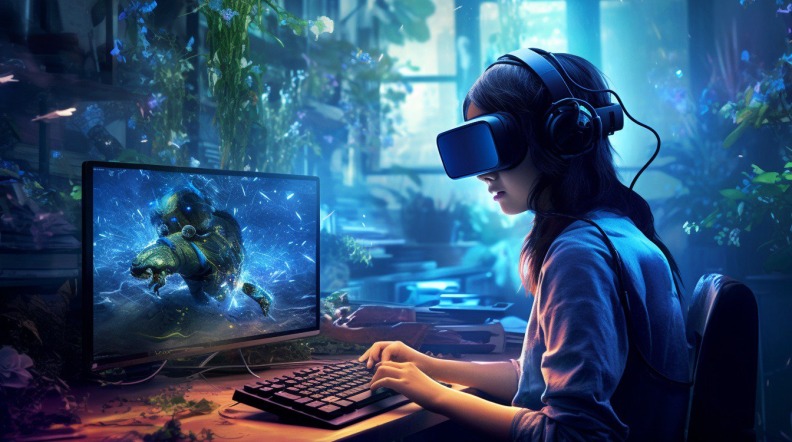AI in Gaming Industry: Revolutionizing Play and Development






The advent of Artificial Intelligence (AI) in the gaming industry has ushered in an era where player experiences and user-generated content are reaching new heights of sophistication and engagement. AI technologies are not only enhancing the ways games are played but are also revolutionizing the processes behind their development. This fusion of AI with gaming opens up vast possibilities for personalized gaming experiences, making each interaction uniquely tailored to the individual player.
Furthermore, AI-driven advancements are enabling developers to create more complex, dynamic game worlds. Through AI, the boundaries of game design and content creation are being pushed further, allowing for the development of games that learn and evolve based on user interaction. This ongoing evolution promises to keep the gaming industry at the forefront of technology, continuously delivering immersive and captivating experiences to players around the globe.
Unveiling the Role of AI in Modern Gaming
In modern gaming, AI plays a crucial role, bringing to life complex environments that challenge and engage players in ways previously thought impossible. The historical match between Garry Kasparov and an AI chess program marked the beginning of a new era in gaming, highlighting the potential of AI to create deeply strategic and compelling game experiences.
The Essence of AI in Gaming
At its core, game AI is about enhancing how games function and interact with players. It’s the invisible force that makes games feel alive, responsive, and endlessly fascinating. Through AI, games can adapt to players’ strategies, create unforeseen challenges, and provide a level of interaction that mirrors human-like complexity.
Transforming Game Design with AI
AI is transforming game design by introducing sophisticated game mechanics and streamlining content creation. This allows for the development of games that are not only more engaging but also more diverse, offering players a plethora of experiences that were once beyond the reach of traditional game development.
AI-Generated Characters and Dynamic Environments
The introduction of AI-generated characters and dynamic environments in open-world games has significantly elevated immersive gaming experiences. These AI-driven elements contribute to a richly detailed world that reacts and evolves based on player interactions, making each gaming session unique and unpredictable.
The Art of Procedural Content and Game Worlds
Procedural content generation has revolutionized the way adventure games are designed and experienced. By leveraging AI, developers can create vast, explorable game worlds that dynamically adapt and change as players progress through the game, ensuring a fresh experience with every playthrough.
Elevating Player Experience through AI
Game AI is pivotal in elevating player experience, making games more engaging and personalized. By understanding player behavior, AI can adjust game dynamics in real-time, offering a tailored challenge that keeps players immersed and invested.
Adaptive Gameplay and Enhanced Realism
AI technologies are transforming game worlds into highly adaptive and realistic environments. These dynamic game settings adjust in complexity and challenge based on the player’s skill level, enhancing the overall realism and keeping the gameplay engaging and balanced.
Intelligent NPCs and Emotional Engagement
The development of intelligent NPCs (Non-Player Characters) has made games more immersive and interactive. Through AI, NPCs can now exhibit behaviors and emotions that respond to player actions, creating a deeper level of emotional engagement and enhancing the storytelling aspect of games.
Pioneering Innovations: AI’s Contribution to Gaming
Game AI has been at the forefront of pioneering innovations in the gaming industry, driving the creation of games that are more complex, engaging, and intelligent than ever before. This technological leap has opened new avenues for creativity and interaction within the gaming world.
Procedural Content Generation: The Engine of Creativity
In adventure games, procedural content generation has become the engine of creativity, enabling endless variations in game environments and narratives. By adapting to the player’s actions and adjusting difficulty levels accordingly, AI ensures that each journey through the game remains challenging and engaging.
Generative AI in Gaming: A New Frontier
Generative AI represents a new frontier in gaming, pushing the boundaries of content creation and narrative possibilities. This innovative approach allows for the development of unique, evolving game narratives that adapt to player decisions, making each game experience truly one of a kind.
Story Generation and Evolving Game Narratives
By leveraging generative AI, developers can craft stories that are immersive and interactive, with plotlines that evolve based on player choices. This level of narrative flexibility introduces a new dimension to storytelling, where the game world and its characters react dynamically to the player’s actions.
Realistic Animation and Life-like Characters
The application of AI in creating realistic animation and life-like characters has significantly enhanced immersive gaming experiences. These advancements allow characters to move and interact in ways that closely mimic real-life behaviors, bringing unparalleled depth and realism to the virtual world.
Ethical Considerations in AI-Driven Games
Gaming companies are increasingly facing ethical considerations in the deployment of AI-driven games. Issues such as data privacy, content appropriateness, and the psychological impact on players are at the forefront, requiring careful navigation and responsible implementation of AI technologies.
Balancing Data Privacy with Personalization
In the gaming industry, AI’s ability to personalize player experiences must be carefully balanced with the imperative of safeguarding user data privacy. Developers are tasked with creating immersive, tailored experiences while respecting stringent data protection laws. Achieving this equilibrium requires sophisticated algorithms that can provide customized content without overstepping privacy boundaries. It’s a delicate dance, where transparency and user consent become paramount, ensuring that personalization enhances gameplay without compromising data security.
Addressing Game Addiction and Offensive Content
The rise of AI in gaming has necessitated a proactive stance against game addiction and the proliferation of offensive content. By leveraging AI, developers can now design systems that monitor player behavior for signs of addiction, offering breaks or suggesting less intensive gameplay modes. Simultaneously, AI-driven content moderation can identify and mitigate offensive material, ensuring a safer gaming environment. These strategies are crucial for fostering a healthy, inclusive gaming culture.
The Technological Synergy: AI and Game Development
The fusion of AI with game development has catalyzed a transformative shift in the industry, enabling more dynamic and immersive gaming experiences than ever before.
Game Development Enhanced by AI
AI has revolutionized game development, particularly in the realm of visual effects, elevating the visual storytelling and immersion of games.
Streamlining Pre-Production and Planning
AI systems have become invaluable in the pre-production and planning stages of game development. By analyzing player data, these systems can predict player choices and preferences, guiding developers in creating content that resonates with their audience. This data-driven approach streamlines the development process, ensuring that games are not only engaging but also aligned with player expectations.
Quality Assurance and Bug Detection Strategies
Throughout the game development process, AI plays a pivotal role in quality assurance and bug detection. By automating the identification of glitches and errors, AI systems expedite the refinement of games, ensuring a smoother, more reliable gaming experience. This technological aid is crucial for maintaining high standards of quality in a highly competitive market.
The Future of AI in Game Design
The video game industry stands on the brink of a new era of innovation, propelled by advancements in AI.
Dynamic Storytelling and User-Generated Content
AI is reshaping storytelling in games, enabling dynamic narratives that adapt to player choices, thereby enhancing player engagement. Moreover, AI facilitates the creation and integration of user-generated content, allowing players to contribute to the game world, enriching the gaming experience with a diversity of perspectives and creativity.
Virtual Reality (VR) and Augmented Reality (AR) Enhancements
AI is instrumental in pushing the boundaries of virtual worlds and interactive experiences in VR and AR. Through sophisticated algorithms, these technologies become more immersive and responsive, creating a sense of presence and interaction that was previously unimaginable. AI’s role in enhancing virtual and augmented realities marks a significant leap forward in how we experience digital worlds.
AI’s Multifaceted Impact on Gaming Industry Segments
AI’s influence spans various gaming industry segments, enriching player experiences and fostering innovation in user-generated content.
Boosting the Mobile Gaming Experience
Mobile gaming has seen a significant uplift through AI, with enhanced personalization and adaptive difficulty levels ensuring a more engaging experience for a diverse audience. This tailoring of gameplay not only retains players but also subtly guides them through the game, making mobile games more accessible and enjoyable for everyone.
Cloud-Based Gaming: A Realm of Possibilities
Cloud gaming has opened up a new dimension of possibilities, breaking down hardware barriers and enabling gamers to enjoy high-quality gaming experiences across devices.
Leveraging Cloud for Seamless Play and Storage
By harnessing the cloud, games can now offer seamless play experiences, with the added benefit of cloud storage eliminating the need for substantial local storage. This advancement has made gaming more accessible, allowing players to dive into their favorite games from anywhere, on any device.
The Role of Cloud in Multiplayer and Online Games
Cloud technology has significantly impacted online games, facilitating smoother, more reliable multiplayer experiences. It supports the infrastructure needed for large-scale online worlds, ensuring that players can connect and engage with each other in real-time, without the limitations of physical hardware constraints.
The Thriving Ecosystem of AI in Indie and Smaller Studios
In smaller studios, AI technologies lower development costs and streamline content creation, allowing for more innovative gameplay experiences even within tight budgets. This democratization of game development tools, including AI, empowers indie developers to compete in the mobile game market, fostering a rich ecosystem of diverse and creative games.
Leveling the Playing Field with Procedural Generation
Procedural generation, a hallmark of AI’s potential, is democratizing game development by allowing smaller studios to produce complex, expansive game worlds without the need for extensive resources. This technology generates landscapes, levels, and content algorithmically, enabling indie developers to compete with larger studios. It not only economizes the production process but also injects a level of unpredictability and uniqueness into the gaming experience, making each player’s journey distinct.
Creative Solutions for Budget Constraints
In an industry where high-quality content creation often demands significant investment, AI presents cost-effective solutions for overcoming budget limitations. Techniques such as procedural generation for environments and AI-driven NPCs reduce the need for manual asset creation and character development. This not only cuts down production costs but also speeds up development, allowing smaller game studios to deliver rich, engaging experiences that stand out in a competitive market.
The Dual Edges of AI in Gaming: Opportunities and Challenges
Gaming companies stand at a crossroads, where AI offers both unprecedented opportunities and formidable challenges. While AI can revolutionize game design and player interaction, it also raises issues related to job displacement and ethical concerns in game development.
Navigating the Ethical Maze of AI in Games
The video game industry faces a complex ethical landscape as it integrates AI into more aspects of gaming. Ensuring AI-driven content remains challenging and engaging while respecting player privacy and preventing addictive designs is paramount. This balance requires ongoing dialogue and ethical frameworks that evolve alongside technological advancements, ensuring games continue to be a source of joy and not harm.
Intellectual Property and Creative Concerns
As AI becomes more integrated into game development, intellectual property and creative concerns come to the forefront. Ensuring originality while leveraging AI’s capabilities poses a challenge for developers.
Potential for Innovation vs. Fear of Homogenization
The advent of AI in gaming sparks a debate between the potential for unparalleled innovation and the fear of creative homogenization. While AI can generate unique game elements and narratives, there’s concern over games losing their human touch, becoming predictable and less diverse. Striking a balance between leveraging AI for innovation and preserving the creative essence that defines game development is crucial.
Talent Dynamics and the Future of Game Development Jobs
The integration of AI into game development is reshaping talent dynamics within the industry. While AI can automate repetitive tasks, freeing developers to focus on more creative aspects, it also raises concerns about job displacement. The future of game development jobs will likely emphasize collaboration between AI and human creativity, fostering new skills and roles within the industry.
Proactive Solutions for AI’s Ethical Dilemmas
Gaming companies are tasked with developing proactive solutions to address the ethical dilemmas posed by AI. This includes creating transparent AI policies and ensuring that AI-driven content is developed responsibly.
Developing Guidelines for Ethical AI Use
As gaming companies navigate the ethical implications of AI, developing comprehensive guidelines for its use becomes essential. These guidelines should address data privacy, prevent bias, and ensure AI technologies enhance the gaming experience without compromising ethical standards. By setting clear parameters, companies can harness the benefits of AI while mitigating risks.
Ensuring Diverse and Inclusive Game Content
AI holds the promise of making game content more diverse and inclusive. By analyzing vast amounts of data on player behavior and preferences, AI can help developers create games that cater to a wider audience. This approach not only enriches the gaming ecosystem but also fosters a more inclusive community by representing a broader spectrum of experiences and perspectives.
Glimpsing the Future: AI’s Evolutionary Path in Gaming
The future of gaming is intricately linked to the evolution of AI, with predictive analytics, online games, and realistic NPCs at the forefront of this transformation.
Next-Gen AI Technologies Shaping the Future
Predictive analytics, online games, and the development of realistic NPCs are set to define the next generation of gaming technologies. These advancements promise to make games more immersive and personalized, offering players experiences that are increasingly responsive and dynamic.
Blockchain and NFTs in Gaming
Blockchain technology and NFTs are introducing new paradigms in gaming, allowing for unique in-game assets and potentially transforming game economies. By ensuring ownership and scarcity of digital items, these technologies offer players unprecedented control and investment opportunities, further blurring the lines between virtual and real-world value.
The Intersection of AI and Geospatial Technologies
The integration of AI with geospatial technologies is opening new frontiers in gaming, enabling games that are more connected to the real world than ever before. This fusion can create dynamic game environments that reflect real-time changes in the world, offering players a deeply immersive and constantly evolving gameplay experience.
The Horizon of AI in Gaming by 2024 and Beyond
Looking ahead to 2024 and beyond, the gaming industry is poised to witness the continued integration of AI, shaping the development of games that are more realistic, engaging, and personalized than ever before.
Anticipating Major Trends and Innovations
The gaming industry is on the brink of a transformation, with AI at its core. Innovations such as AI-generated game levels and characters that can interact with players in nuanced ways are setting the stage for a new era. These advancements promise to enhance gameplay by introducing dynamic gaming aspects never seen before. As developers continue to harness the power of AI, the boundary between virtual and reality blurs, offering players immersive and engaging experiences that were once the realm of science fiction.
The Continuous March Towards Hyper-Realistic Gaming Experiences
AI’s integration into gaming is steering the industry towards hyper-realistic experiences. By leveraging advanced AI to generate lifelike characters and environments, developers are enhancing the gaming landscape significantly. This push towards realism ensures that players are not just participants but are fully immersed in intricately detailed worlds. The evolution of computer graphics, powered by AI, is transforming game design, making every frame and interaction within the game more realistic and captivating.
Navigating the AI in Gaming Industry: A Strategic Roadmap for Developers
For developers aiming to stay ahead, embracing AI in video games is not an option but a necessity. The potential of AI to revolutionize game development, from procedural content generation to intelligent NPCs, is immense. Developers must focus on integrating AI to enhance creative aspects and player engagement, ensuring their games offer fresh, immersive experiences. This strategic embrace of AI will be crucial in defining the future landscape of AAA games.
How Game Developers Can Leverage AI Effectively
Game developers have a unique opportunity to leverage AI for creating more immersive experiences. By focusing on the integration of AI in the game development process, they can unlock new potentials for player engagement. Advanced AI technologies allow for dynamic game levels and environments, enhancing the role of AI in creating immersive experiences that keep players engaged and invested in the gameplay. This innovative approach ensures that each player’s journey is unique, cementing AI’s pivotal role in game development.
Embracing AI for Procedural Content and Beyond
AI’s ability to generate endless game levels and environments through procedural content generation is revolutionizing how developers approach game design. This technology not only saves valuable development time but also introduces an element of surprise and novelty for players. Beyond procedural generation, AI is being used to create complex narratives and game mechanics that adapt to player actions. This level of dynamic content creation is setting a new standard for what games can offer, making each playthrough a unique experience.
Tailoring Player Experiences with AI Analytics
By leveraging AI analytics, developers can now tailor gaming experiences to individual players like never before. These analytics provide insights into player behavior, preferences, and engagement levels, allowing for the customization of game aspects to enhance player satisfaction. This personalization ensures that the game evolves in response to player actions, creating a deeply immersive and engaging experience. AI analytics are proving to be an invaluable tool in developing games that resonate with players on a personal level.
The Synergy Between AI and Human Creativity
The collaboration between AI and game designers is fostering a new wave of creativity in the gaming industry. AI’s capacity to process and analyze player feedback and choices allows designers to refine game elements, making them more engaging and enjoyable. This synergy ensures that games are not only technologically advanced but also deeply resonate with human emotions and creativity, leading to richer and more immersive gaming experiences.
Ensuring AI Complements Rather Than Replaces Human Touch
While AI brings unprecedented capabilities to game development, ensuring it complements rather than replaces the human touch is crucial. Game designers leverage AI to enhance storytelling and gameplay mechanics, yet the essence of game creation remains deeply human. By using AI as a tool to realize their vision, designers can create games that are not only technologically sophisticated but also emotionally compelling. This balance between AI capabilities and human creativity is key to advancing the gaming industry while preserving its heart.
Fostering Collaboration Between AI and Game Designers
The collaboration between AI and game designers is essential for pushing the boundaries of what games can be. By harnessing AI’s capabilities, game designers can create more complex and adaptive game environments. This partnership allows for a deeper exploration of creative possibilities, ensuring games are both innovative and engaging. As AI continues to evolve, its role in supporting and enhancing the creative process in game design will only grow, promising a future where games are more immersive and personalized than ever before.
Conclusion: AI in Gaming – The Dawn of a New Era
As we reflect on the transformative journey of AI in gaming, it’s clear that we are at the dawn of a new era. AI in gaming refers to more than just technological advancements; it encompasses a shift towards creating more ethical, engaging, and immersive game experiences. With intelligent behaviors becoming the norm, games can offer human players more complex and rewarding experiences. The integration of AI is not just changing how games are developed but is also reshaping the very core of gaming, promising a future rich with possibilities.
Reflecting on AI’s Transformative Journey in Gaming
The gaming industry has witnessed a significant transformation, driven by the integration of AI. From enhancing game levels with dynamic content to creating adaptive NPCs, AI has redefined what games can offer. This journey has not only pushed the boundaries of technological innovation but has also led to the creation of more immersive and engaging gaming experiences. As AI continues to evolve, its impact on the industry will undoubtedly grow, marking a pivotal moment in the history of gaming.
The Prospects of AI: Enriching Gaming Tomorrow and Beyond
Looking towards the future, the prospects of AI in enriching gaming are boundless. With advancements in data mining, machine learning algorithms, and generative adversarial networks, the potential for creating adaptive experiences in video games is expanding. The gaming industry has witnessed how these emerging technologies can keep players engaged through more personalized and immersive game experiences. As computer graphics continue to advance and video game development embraces these technologies, the path is set for an era where games are not only visually stunning but also deeply personalized and engaging.